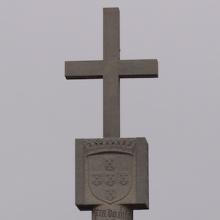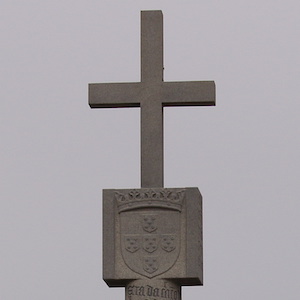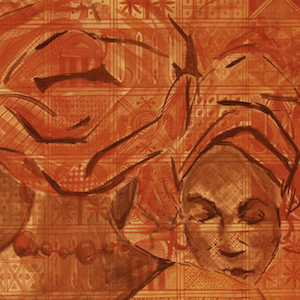Africa

Short Teaching Module: Christianity and Slavery in the Kingdom of Kongo, 1480s-1520s
Portuguese missionaries brought Christianity to West Africa in the late fifteenth century. They had their greatest success at conversion in the Kingdom of the Kongo, a powerful state that was never conquered in the early modern period.

Crucifix (Nkangi Kiditu)
This 17th-century brass Kongolese crucifix was based on European models, but transformed by the local artisan who made it. In the center is Jesus, but with large hands, flattened feet, and African facial features, including protruding eyes that convey spiritual connection.
Excerpt of letter from Nzinga Mbemba to Portuguese King João III
In 1526, the king of the Kongo, Nzinga Mbemba (who by this time had adopted the Christian name of Afonso I) began writing a series of twenty-four letters to the Portuguese King Joao III appealing for an end to the slave trade.

Padrão
In the 1480s, the Portuguese brought pillars (or padraos) with them in their explorations of western and southwestern Africa and placed them at prominent points, claiming these for Portugal. This is a replica of one of them, from what is now called Cape Cross, in Namibia.

Freedom Narratives
Altogether, this free online website is an important resource for students and teachers who desire to understand biographical accounts and experiences of people from West Africa who fought to regain their freedom.
Global Architectural History Teaching Collaborative
Perhaps most interesting and relevant for world history teachers and students are the modules that make connections across space and time.
Early Caribbean Digital Archive
The ECDA is an essential educational resource for studying the history of enslaved and free African, Afro-creole, and Indigenous peoples of the Caribbean, European imperialism and colonialism, and the history of the Caribbean within the wider Atlantic World.
Slave Voyages
Slave Voyages is an essential project for those seeking to learn more about enslavement and imperial powers in the Atlantic World, the transatlantic slave trade and Middle Passage, and the African diaspora.
National Museum of African Art
This site showcases an incredible collection of artwork from across the African continent, including more than 1,500 ancient artifacts, pieces collected in the colonial era, photographs, textiles, and works by modern African artists.